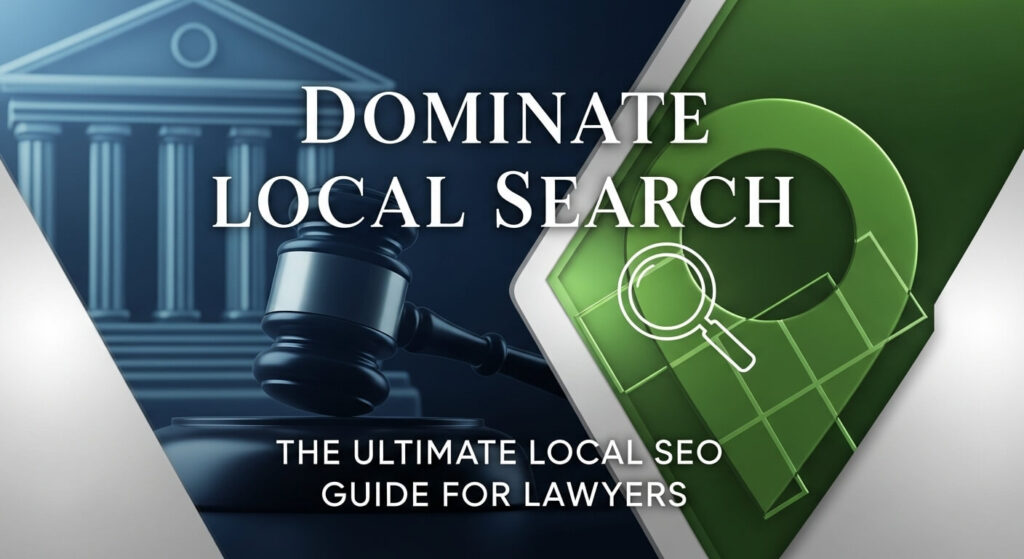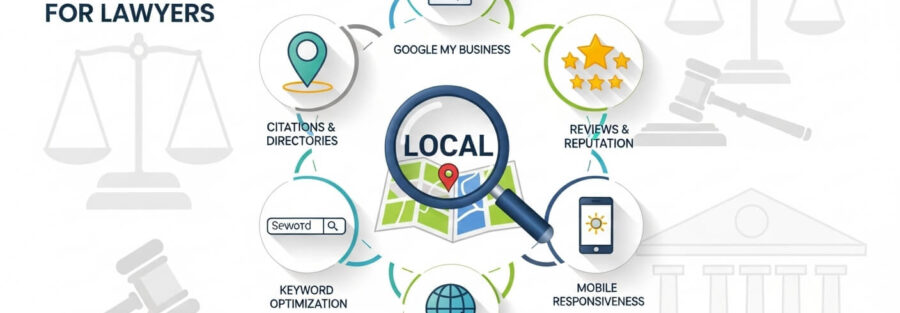
Dominate Local Search: The Ultimate Local SEO Guide for Lawyers
Imagine a potential client right now, needing legal help. They pull out their phone, type “personal injury lawyer near me” or “divorce attorney .” What shows up? If your law firm isn’t among the first few results, you’re missing out. Millions of people look for local businesses online every day. For lawyers, being visible in these local searches is not just helpful; it’s essential. This article will show you how to connect with clients searching for legal help right in your community. Local SEO makes your firm easy to find when people need you most.
Understanding the Power of Local SEO for Law Firms
Why Local Search Matters for Legal Services
People searching for legal help often have an immediate need. They want a lawyer close to home or work. Think about “divorce lawyer ” or “real estate attorney near me.” These searches show clear intent. Users are looking for someone to hire, not just general information. This is why location matters so much for law firms. About 88% of consumers use online search to find local businesses, including legal services. If your firm isn’t visible locally, you miss these ready-to-hire clients.
Key Differences: Local SEO vs. General SEO for Lawyers
General SEO aims to rank high for broad terms across the internet. Local SEO is different. It zeroes in on geographic areas. It uses tools like your Google Business Profile. It also depends on local citations, which are mentions of your firm’s name and address. These things are less critical for general SEO. Local SEO helps you stand out in your specific community, not just the whole web. It brings local clients directly to your door.
Optimizing Your Google Business Profile: Your Digital Storefront
Google Business Profile (GBP) is the most powerful tool for local law firm visibility. It’s like your firm’s digital front door. Optimizing it correctly can bring many new clients.
Claiming and Verifying Your Google Business Profile
First, you must claim your firm’s Google Business Profile. Go to business.google.com and search for your firm. If it appears, claim it. If not, create a new one. Google will ask you to verify your listing. This often involves a postcard sent to your physical address. Verification builds trust and lets your profile appear in search results. Without it, your firm won’t show up.
Essential Elements of a High-Converting GBP Listing
Every detail on your GBP listing matters. Get these right to attract more clients.
- Business Name, Address, Phone Number (NAP): Make sure your firm’s name, address, and phone number are exact. They must be the same everywhere online. Any small difference can confuse search engines.
- Categories: Choose the most fitting categories. Start with your primary practice area, like “Personal Injury Attorney.” Then add secondary ones, such as “Divorce Lawyer” or “Real Estate Attorney.” These tell Google what you do.
- Services: List all the specific legal services you offer. Be detailed here. This helps potential clients find exactly what they need.
- Business Description: Write a clear, keyword-rich description. Include your firm’s focus and what makes you unique. Mention your location naturally.
- Photos and Videos: High-quality pictures make a difference. Include photos of your office, team, and even client meeting spaces. Videos can also show off your firm’s personality.
- Business Hours: Always keep your hours current. Make sure holidays are updated too. Wrong hours can lead to frustrated clients.
Leveraging Google Business Profile Features
Beyond the basics, use GBP’s interactive features to engage potential clients.
- Posts: Use GBP posts for news, legal tips, or service updates. You can share recent blog articles or upcoming events. Posts keep your profile fresh and active.
- Q&A: Monitor the Q&A section. Answer common questions about your firm or services. You can even post your own frequently asked questions and answers. This helps guide clients.
- Reviews: Reviews are very important. We will cover how to get and manage them soon.
- Messaging: Turn on the messaging feature. This lets potential clients text your firm directly. Be ready to reply quickly. Quick responses show you care.
Building Local Authority with Citations and Online Mentions
Search engines look at many signals to decide where to rank your firm. Citations are a big part of this. They prove your business is real and located where you say it is.
The Importance of NAP Consistency and Citations
A citation is any online mention of your law firm’s name, address, and phone number (NAP). This could be on a directory, a local blog, or a social media profile. Consistency is key. If your NAP differs across websites, search engines might get confused. This can hurt your local ranking. Make sure your firm’s NAP is identical everywhere it appears online.
Identifying and Optimizing Key Legal Directories
Your firm needs listings on important directories. These act as votes of confidence for search engines.
- Industry-Specific Directories: These are crucial for lawyers. Think about Avvo, FindLaw, and Lawyers.com. Make sure your profile is complete and accurate on each.
- General Local Directories: Yelp, Yellow Pages, and your local Chamber of Commerce are also important. Any place a local business can be listed, your firm should be.
- Actionable Tip: Use tools like BrightLocal or Moz Local. They can help you audit your existing citations. These tools also find new places to list your firm.
Beyond Directories: Local Mentions and Partnerships
Look for mentions outside of simple directories. These carry extra weight.
- Local News Sites/Blogs: Can you offer expert commentary to a local news outlet? A mention or link on their site is very valuable. Write a press release about a community event or award.
- Local Sponsorships: Sponsor a local sports team or charity event. This often gets your firm’s name and website mentioned on their site. For example, a law firm sponsoring a community park cleanup might get its name and a link on the city’s event page. Such mentions build local relevance and trust.
On-Page SEO for Local Law Firm Websites
Your firm’s website is a central hub. It also needs to speak to local search engines and clients. This means optimizing the content on your site itself.
Keyword Research for Local Legal Services
Knowing what local clients search for is step one. This helps you create content they will find.
- Geographic Modifiers: People often add their city or neighborhood. Think “[practice area] lawyer [city]” or “best [practice area] attorney [neighborhood].”
- “Near Me” Searches: People use “near me” a lot. While you don’t directly target “near me,” optimizing for your specific city helps you rank for it.
- Actionable Tip: Use free tools like Google Keyword Planner. SEMrush or Ahrefs also offer great keyword insights. Find out what local people type into Google.
Optimizing Website Content for Local Search
Once you have your keywords, use them wisely on your site.
- Location-Specific Landing Pages: If your firm serves multiple cities, make a page for each. For instance, have one page for “Divorce Lawyer in [City A]” and another for “Divorce Lawyer in [City B].” Each page should have unique content.
- Homepage Optimization: Your homepage should clearly state your main practice areas and location. Include local keywords in your title tags, headings, and body text.
- Content Strategy: Write blog posts about local legal issues. For example, “Understanding Local Traffic Laws in [Your City]” or “How to Handle Property Disputes in [Your County].” This shows local relevance.
Technical SEO for Local Performance
Some technical details make a big difference. They help search engines understand your site better.
- Mobile-Friendliness: Most people search for lawyers on their phones. Your website must work perfectly on mobile devices. A slow or broken mobile site will lose clients.
- Page Speed: No one likes a slow website. Make sure your pages load fast. Slow speeds push visitors away and can hurt rankings.
- Schema Markup: This is code you add to your website. It helps search engines understand details like your firm’s address, hours, and services. Use “LocalBusiness” schema to tell Google your firm’s location.
Harnessing the Power of Online Reviews and Reputation Management
Online reviews are critical. They influence potential clients and boost your local SEO. People trust what others say about a business.
Why Online Reviews Are Crucial for Lawyers
Reviews build strong social proof. They show future clients that others had good experiences. They are also a direct ranking signal for local search. Google favors businesses with many positive reviews. Studies show that 93% of consumers read online reviews before choosing a local business. For lawyers, a strong review profile can be a deciding factor.
Strategies for Earning More Positive Reviews
Don’t just wait for reviews. Ask for them!
- Asking at the Right Time: Ask happy clients for a review after a positive outcome. A successful case resolution is a great moment.
- Providing Direct Links: Make it easy for clients to leave reviews. Send them a direct link to your Google Business Profile, Avvo, or Yelp page.
- Email Follow-ups: A polite email reminder after a case wraps up can work wonders. Include those direct links.
- Actionable Tip: Train your staff. Teach them how to politely and ethically ask clients for reviews. This makes it a natural part of your client process.
Responding to Reviews: The Good, the Bad, and the Ugly
Always respond to reviews. It shows you value client feedback.
- Responding to Positive Reviews: Thank clients for their kind words. Reiterate your commitment to great service. A simple “Thank you for your trust!” is effective.
- Responding to Negative Reviews: Address concerns calmly and professionally. Never get defensive. Offer to take the conversation offline to resolve issues. This shows potential clients you care about satisfaction. A legal marketing expert once said, “Ignoring negative feedback is a missed opportunity to demonstrate professionalism.”
Measuring and Refining Your Local SEO Efforts
Local SEO is not a one-time task. You need to track your progress and adjust your strategy. This ensures long-term success.
Key Local SEO Metrics to Track
Watch these numbers to see how well your local SEO is doing:
- Google Business Profile Insights: Check how many people view your profile. See how many click to your website, call you, or ask for directions. These are direct signs of engagement.
- Local Pack Rankings: How high does your firm appear in the “map pack” for your target keywords? This is a prime spot in local results.
- Website Traffic from Local Sources: Use Google Analytics to see where your website visitors come from. Look for traffic originating from local searches.
- Conversions: Are local searches leading to actual clients? Track calls, form submissions, and direct visits. These are your true leads.
Tools for Local SEO Analysis
Many tools can help you monitor your local SEO performance.
- Google Analytics: This tool helps you understand your website traffic. You can see how many people visit and what they do on your site.
- Google Search Console: See how your site performs in Google search results. It shows what keywords people use to find you and any indexing problems.
- Google Business Profile Insights: This is built right into your GBP. It gives you data specific to your local listing.
- Third-Party Local SEO Tools: Consider tools like Moz Local, BrightLocal, or SEMrush Local. They offer deeper insights and help manage citations.
Adapting Your Strategy for Long-Term Success
Local SEO is always changing. Staying on top of it means ongoing effort.
- Regular Audits: Periodically check your Google Business Profile. Review your citations and website content. Make sure everything is current and optimized.
- Staying Updated: Google’s algorithms change often. Keep up with the latest local SEO best practices.
- Competitor Analysis: See what successful local law firms are doing. What keywords are they using? How do their GBP profiles look? Learn from their wins.
Conclusion
Making your law firm visible in local search results is a powerful way to grow. It means optimizing your Google Business Profile, building strong local citations, and fine-tuning your website content. Reputation management through reviews is also vital. These efforts help you connect with people actively searching for legal help right in your area. Start by claiming your GBP and ensuring NAP consistency. Then, ask for reviews and create local content. Consistent effort in local SEO yields real results. Your firm will attract more local clients and secure its place as a trusted community resource. Invest in local SEO; your future clients are searching now.



